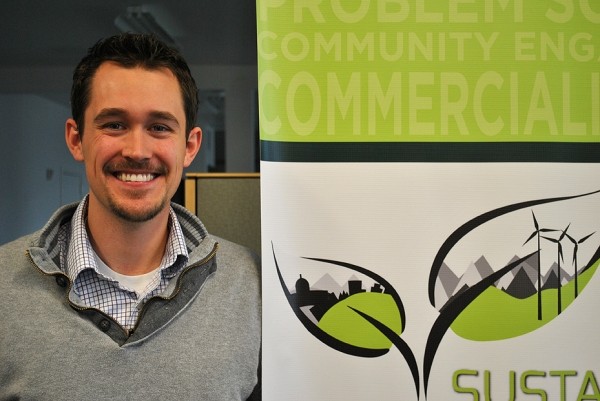Sustainable Startups @ The Leonardo
Ian Shelledy: Goal of sharing ideas and making sustainability the norm
By Rachel Piper @racheltachelIan Shelledy says there are a lot of local people working toward a sustainable future, but too many of them are working on their own, unable to share ideas or get inspired. Shelledy is the community manager at the nonprofit Energy Commercialization Center, which is hosting the Sustainable Startups series at The Leonardo (209 E. 500 South), where entrepreneurs will come together to share their struggles and successes and talk about the triple bottom line: being environmentally responsible, building community and making profit. The second event in the series (Tuesday, Oct. 8, 6-8:30 p.m., $10 advance/$15 at door) is built around the theme of sustainable resources and will feature panelists from EcoScraps, PK Clean, Momentum Recycling and other businesses that create products from “waste.” The final event, Nov. 12, will look at how businesses can embrace sustainability in their practices. The ECC is also looking to provide working space and support to sustainable-focused entrepreneurs; visit SustainableStartups.org for more information.
What kind of sustainable businesses are out there—are they all making bamboo yoga mats?
When you talk about sustainable business, that can really mean anyone. There are people who sell solar panels and people who do the hemp yoga mats and those kinds of things, which are great, but it’s really more than that. The third part of our series is trying to get at that perspective. We have companies coming in like eBay and Adobe and Black Diamond. We don’t care if you’re building an iPhone app or growing organic vegetables in a community garden or anything in between—there’s opportunity in every business model to be more sustainable. It’s practices and services as well as products.
How did you get involved in sustainability?
I had worked in local government and in some environmentally oriented nonprofits, and then I went back to graduate school and studied environmental policy and sustainability. When I was working and when I was studying, I found that, so often, when you talk about environmental issues, it’s so contested, so bitter. It’s one side pitted against the other, and you have these terrible choices you have to make between economic development and money for the community, and preserving components of the environment. I always thought there was a lot of hope there, but it never seemed to get realized. And then, I learned more and more about sustainability, and I realized that’s where that hope is, because if you take a people/planet/profit approach, it just makes sense. You don’t have to believe in climate change ... saving energy, using less product, finding more efficient ways to do things, giving back to the community—it all makes sense. It all will help your business. So it creates that win-win scenario that I had always been searching for.
There are a lot of alternative energy possibilities—are we going to figure out the winner soon?
You really need a diverse energy mix, just because of all the variables that play into energy, in terms of cost and accessibility. There’s room for all kinds of energy, just depending on the context. We need to keep that open mind, and say, “Hey, what energy source fits this context or this area or this need?” and then plug in the appropriate one, and not get stuck on, “solar’s the best!” or “natural gas is the best!”
There’s some really exciting stuff happening in nuclear that, if it comes to fruition, will offset a lot of the traditional problems—waste and weapons and risk of meltdowns. And it’s happening right here in Utah—the people developing the technology, they’re here, and people don’t know that.
Do you think that there will come a time when sustainability will be the norm and we won’t have to talk about it?
I hope so. That’s the goal. And in my opinion, someday it’s going to have to be that way—we’re going to have to be sustainable; there’s no choice about it. If you have a growing population with increasing needs on a planet with finite resources, you have to be sustainable at some point. But the question is when—and our goal is to help people get there sooner rather than later so we can offset a lot of the negative consequences that will happen if we embrace sustainability too late.
Twitter: @RachelTachel
More by Rachel Piper
-
The Big Read
Debbie Ehrman and Tommy Hamby on the shared reading experience
- Feb 4, 2015
-
Brooke Young of the Printz Award Committee
Awarding excellent books for young adults
- Jan 28, 2015
-
Linda Strasburg: InterViews & InterActions
Utah's longest-running female radio personality
- Jan 21, 2015
- More »





